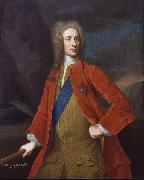China al por mayor de Marco de Oleo |
|||||||||||

|
|||||||||||
|
|
|
||||||||||||||
|
William Aikman
William Aikman (24 October 1682 - 7 June 1731) was a Scottish portrait-painter. Aikman was the son of William Aikman, of Cairney. His father intended that he should follow the law, and gave him an education suitable to these views; but the strong predilection of the son to the fine arts induced him to attach himself to painting alone. Poetry, painting, and music have, with justice, been called sister arts. Mr. Aikman was fond of poetry; and was particularly delighted with those unforced strains which, proceeding from the heart, are calculated to touch the congenial feelings of sympathetic minds. It was this propensity that attached him so warmly to Allan Ramsay, the Doric bard of Scotland. Though younger than Ramsay, Mr. Aikman, while at college, formed an intimate acquaintance with him, which constituted a principal part of his happiness at that time, and of which he always bore the tenderest recollection. It was the same delicate bias of mind which at a future period of his life attached him so warmly to Thomson, who then unknown, and unprotected, stood in need of, and obtained the warmest patronage of Aikman; who perhaps considered it as one of the most fortunate occurrences in his life that he had it in his power to introduce this young poet of nature to Sir Robert Walpole, who wished to be reckoned the patron of genius, and to Arbuthnot, Swift, Pope, Gay, and the other beaux esprits of that brilliant period. Thomson could never forget this kindness; and when he had the misfortune, too soon, to lose this warm friend and kind protector, he bewailed the loss in strains distinguished by justness of thought, and genuine pathos of expression. |
||||||||||||||
|
|
||||||||||||||
|
||||||||||||||
|
|
||||||||||||||
| William Aikman
William Aikman (24 October 1682 - 7 June 1731) was a Scottish portrait-painter. Aikman was the son of William Aikman, of Cairney. His father intended that he should follow the law, and gave him an education suitable to these views; but the strong predilection of the son to the fine arts induced him to attach himself to painting alone. Poetry, painting, and music have, with justice, been called sister arts. Mr. Aikman was fond of poetry; and was particularly delighted with those unforced strains which, proceeding from the heart, are calculated to touch the congenial feelings of sympathetic minds. It was this propensity that attached him so warmly to Allan Ramsay, the Doric bard of Scotland. Though younger than Ramsay, Mr. Aikman, while at college, formed an intimate acquaintance with him, which constituted a principal part of his happiness at that time, and of which he always bore the tenderest recollection. It was the same delicate bias of mind which at a future period of his life attached him so warmly to Thomson, who then unknown, and unprotected, stood in need of, and obtained the warmest patronage of Aikman; who perhaps considered it as one of the most fortunate occurrences in his life that he had it in his power to introduce this young poet of nature to Sir Robert Walpole, who wished to be reckoned the patron of genius, and to Arbuthnot, Swift, Pope, Gay, and the other beaux esprits of that brilliant period. Thomson could never forget this kindness; and when he had the misfortune, too soon, to lose this warm friend and kind protector, he bewailed the loss in strains distinguished by justness of thought, and genuine pathos of expression. 1720-1725 Medium Oil on canvas Dimensions 125.7 x 101 cm (49.5 x 39.8 in) cyf |
||||||||||||||
|
Related Paintings to William Aikman :. |
||||||||||||||
|
|
||||||||||||||
|
|
||||||||||||||
|
CONTACTE EEUU |







